Are you ready to take the plunge into Washington’s wild heart? The majestic peaks and dense forests make for an ideal hunting paradise. From stalking deer through the stillness of the woods to hearing elks bellow across a valley, this state provides thrilling experiences for novice and veteran hunters alike. So what are you waiting for? Pack your gear and let nature call!
In this comprehensive guide, we have covered all you need to know about hunting in Washington. We have gathered all information about species, season dates, best places to hunt, and license information on this page.
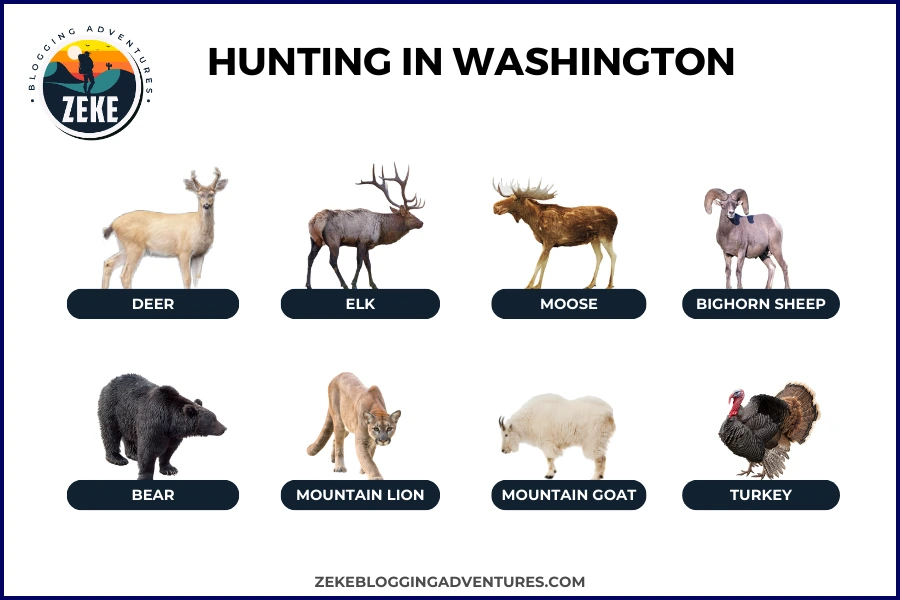
What Can You Hunt in Washington?
Hunting in Washington is a popular pastime, featuring three main types of deer: mule deer, black-tailed and white-tailed. With their graceful antlers and beautiful coats, these majestic creatures live all across the state – from the Cascade Mountains’ lush forests to Eastern Washington’s open plains.
If you’re looking for an even bigger challenge, elk hunting is also available throughout WA. The reward of finding one of these grand animals will be worth every bit of effort.
For those who prefer small game hunting, there are plenty of options with pheasants and quail as well as rabbits and squirrels roaming around this great state. And don’t forget about waterfowl hunting! Ducks and geese flock to Washington’s wetlands for some prime hunts that can provide lasting memories.
Deer
Washington is a paradise for deer hunters with its numerous species, such as mule deer, white-tailed deer, and black-tailed. Each has their own set of unique traits that make them appealing targets to hunt.
Mule deer boast massive antlers which makes them an alluring trophy for any hunter. White-tailed are smaller but highly cunning creatures due to their acute senses making them quite the challenge in the field. Black-tailed can be found abundantly along the western coast of Washington State offering plenty of opportunities during hunting season.
The Cascade Mountains provide excellent cover while on the hunt – not only does it offer rugged terrain but also solitude if desired by experienced hunters seeking adventure away from private ranches accommodating more leisurely hunts across Washington State.
Before heading out into this wilderness, however, it’s important to remain aware of state regulations regarding licenses and tags needed prior to beginning your adventure; these vary depending on the location and type of game sought after – typically running between September through December period.
Hunting ethics are enforced heavily within Washington thus reminding us all how essential safety protocols must be followed when taking shots so they’re always taken within one’s skill level or range limit. To demonstrate respect towards nature & wildlife, we should practice sustainable practices at all times while enjoying our outdoor activities here in The Evergreen State!
Modern Firearm General Deer Season Washington
| Season | Dates | Location |
| High Buck Hunts | 15 Sep – 25 Sep | Specific Regions |
| Black-tailed Deer General Modern Firearm | 14 Oct – 31 Oct | Specific Regions |
| White-tailed Deer General Modern Firearm | 14 Oct – 24 Oct | Specific Regions |
| Mule Deer General Modern Firearm | 14 Oct – 24 Oct | Specific Regions |
| Black-tailed Deer Late Modern Firearm | 16 Nov – 19 Nov | Specific Regions |
| White-tailed Deer Late Modern Firearm | 11 Nov – 19 Nov | Specific Regions |
| White-tailed Deer Senior/Disabled Season | 21 Oct – 24 Oct | Specific Regions |
| White-tailed Deer Youth Seasons | 21 Oct – 27 Oct, 14 Oct – 24 Oct, 21 Oct – 24 Oct | Specific Regions |
Archery General Deer Season WA
| Season | Dates | Location |
| Black-tailed Deer Early Archery | 01 Sep – 24 Sep, 01 Sep – 29 Sep | Specific Areas |
| White-tailed Deer Early Archery | 01 Sep – 24 Sep, 01 Sep – 29 Sep | Specific Areas |
| Mule Deer Early Archery | 01 Sep – 24 Sep, 01 Sep – 29 Sep, 01 Sep – 15 Sep, 16 Sep – 29 Sep | Specific Areas |
| Black-tailed Deer Late Archery | 22 Nov – 15 Dec, 22 Nov – 31 Dec | Specific Areas |
| White-tailed Deer Late Archery | 10 Nov – 15 Dec, 25 Nov – 15 Dec, 20 Nov – 08 Dec, 23 Nov – 15 Dec | Specific Areas |
| Mule Deer Late Archery | 20 Nov – 08 Dec, 21 Nov – 30 Nov, 22 Nov – 08 Dec | Specific Areas |
Muzzleloader General Deer Season WA
| Season | Dates | Location |
| High Buck Hunts | 15 Sep – 25 Sep | Certain Regions |
| Black-tailed Deer Early Muzzleloader | 30 Sep – 08 Oct | Certain Regions |
| White-tailed Deer Early Muzzleloader | 30 Sep – 08 Oct | Certain Regions |
| Mule Deer Early Muzzleloader | 30 Sep – 08 Oct | Certain Regions |
| Black-tailed Deer Late Muzzleloader | 22 Nov – 15 Dec | Certain Regions |
| White-tailed Deer LateMuzzleloader | 22 Nov – 08 Dec, 25 Nov – 08 Dec, 20 Nov – 08 Dec | Certain Regions |
| Mule Deer Late Muzzleloader | 20 Nov – 30 Nov, 25 Nov – 08 Dec | Certain Regions |
Elk
Washington is a haven for elk hunting, boasting two subspecies of the majestic animal – Rocky Mountain and Roosevelt. The Rocky Mountains can be found in the east while Roosevelt Elk have made their home on the Olympic Peninsula, in western Washington. These powerful animals are known to weigh up to 1000 pounds and boast thick coats which make them well-suited for wet climates.
When taking part in this exciting pursuit, it’s important to abide by all regulations set by the state; from obtaining licenses and tags to adhering strictly to bag limits and season times. With its unique characteristics, each species provides an unforgettable experience that requires different skill sets depending on where you hunt them.
Elk season WA
| Season | Dates | Location |
| Eastern Washington Modern Firearm | 01 Aug – 31 Dec | Specific Areas |
| Western Washington Modern Firearm | 04 Nov – 15 Nov | Specific Areas |
| Early Eastern Archery | 01 Aug – 01 Sep | Specific Areas |
| Early Western Archery | 09 Sep – 21 Sep | Specific Areas |
| Late Eastern Archery | 01 Aug – 30 Jan | Specific Areas |
| Late Western Archery | 22 Nov – 15 Dec | Specific Areas |
| Early Eastern Muzzleloader | 01 Aug – 13 Oct | Specific Areas |
| Early Western Muzzleloader | 07 Oct – 13 Oct | Specific Areas |
| Late Eastern Muzzleloader | 01 Aug – 20 Jan | Specific Areas |
| Late Western Muzzleloader | 22 Nov – 31 Dec | Specific Areas |
Moose
Hunting for moose in Washington can be a thrilling experience, but it takes patience and skill to successfully track down these majestic creatures. Blessed with keen senses of sight and hearing, they easily blend into their lush surroundings like a chameleon.
In the early fall season when they’re most active and visible, you may find them grazing in forests, swamps, or marshes across the state – home to one of the largest populations of moose in America; estimated at 5,000 individuals!
At nearly six feet tall at the shoulder and weighing up to 1,500 pounds with antlers spanning six feet wide, it’s no wonder why these animals are sought-after trophies among hunters. However, before heading out on your adventure, make sure you follow all necessary regulations outlined by the Washington Department of Fish & Wildlife as well as obtain proper permits so that we can continue conserving this species now and forever.
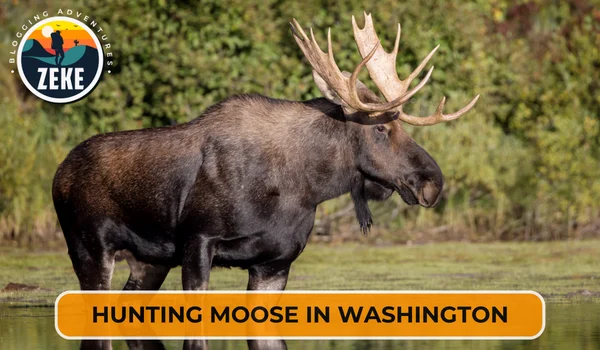
Moose Season (via Special Application only)
| Season | Dates |
| Antlered | 01 Oct – 30 Nov |
| Antlerless | 01 Oct – 30 Nov |
Bear
The black bear population in Washington is estimated to be around 25,000 – one of the largest populations in the US. These bears can be found all over the Evergreen State, from its mountainous terrain to lush valleys. They are truly versatile creatures and have no problem flourishing in a variety of habitats.
Washington’s black bears stand out with their size: they grow up to 6 feet tall and weigh more than 500 pounds! This makes them an unbelievably exciting target for hunters seeking a thrilling challenge.
Although these animals may appear intimidating due to their stature, they’re usually quite shy when it comes to interacting with humans and will steer clear if given a chance. Nonetheless, caution should still always be taken when coming across any wild animal like these magnificent creatures.
If you plan on hunting for black bears here in WA state, then keep this tip handy: dawn and dusk are typically peak times when you’ll find them wandering about so that’s your best bet at spotting ’em!
Spot-and-stalk is often used by many experienced outdoorsmen as well; which involves patiently waiting at vantage points or using binoculars until you catch sight of one before attempting contact – but it pays off big time if done correctly.
Black Bear Season in Washington
| Season | Dates | Location |
| Fall Bear Season | 01 Aug – 15 Nov | Specific Regions |
Mountain Goat
Mountain goats in Washington are an impressive sight, with their thick white coats that allow them to thrive in harsh alpine conditions. These agile animals can be found navigating the steep slopes of the Cascade and Olympic Mountains, making for a thrilling hunt.
Mount Baker-Snoqualmie National Forest is one of the top spots for viewing these majestic creatures. The forest’s rocky terrain and abundant vegetation create an ideal habitat for mountain goats where they can easily graze on meadows or scale cliffs.
Mountain Goat Season (via Special Application only)
| Season | Dates |
| Mountain Goat | 01 Sep – 30 Nov |
Bighorn Sheep
Stalking a herd of Bighorn Sheep is an unforgettable experience for any hunter. These agile creatures can be found in various regions of Washington, including the Cascade Mountains, Okanogan-Wenatchee National Forest, and Hells Canyon, all providing ample food sources such as grasses, shrubs, and herbs to thrive on.
It takes skill and patience to track them down but once you do, it’s truly remarkable – their hooves specially adapted for navigating through rocky terrain allow them to climb even the steepest mountain slopes with ease.
If you have your sights set on hunting a Bighorn Sheep in The Evergreen State, then the time period from September through November is when they are most active – however, tags are limited so getting one could prove difficult.
But don’t let that deter you; it’s worth every effort when you eventually come face-to-face with these majestic animals grazing peacefully across some rugged landscape.
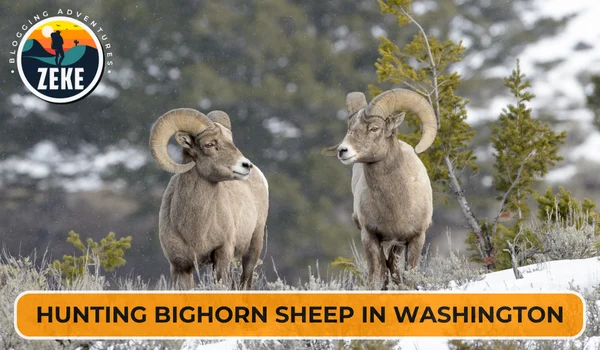
Bighorn Sheep Season (via Special Application only)
| Season | Dates |
| Bighorn Sheep | 15 Sep – 30 Nov |
Turkey
Hunting wild turkeys requires a well-honed set of skills and lots of patience. These birds have sharp eyesight and hearing, so the key is to move slowly and silently through the terrain. Camouflaging yourself can help you get closer to your prey without spooking them away.
For those who are feeling ambitious, luring in these majestic creatures with calls can be an effective tactic – but take time to practice beforehand as it does require some finesse!
Understand their behavior patterns too; they tend to roost at night and then come down in search of food at dawn. That’s when you should plan your hunt accordingly if you want that perfect shot!
Also, remember safety first: always check your surroundings before shooting off any rounds – never take a shot unless there’s nothing blocking your view from hitting the target precisely where intended.
Wild Turkey Season Washington
| Season | Dates | Bag Limit |
| Fall General Season | 01 Sep – 31 Dec | 4 Turkeys in a season |
| Spring General Season | 15 Apr – 31 May | 3 Turkeys in a season |
| Spring Youth only | 01 Apr – 07 Apr | 3 Turkeys in a season |
Mountain Lion
Mountain lions, also known as cougars or pumas, are a formidable part of the Washington state’s wild. They prowl the rugged peaks of the Cascade Mountains and roll through Eastern Washington’s hills with grace and power. Their sharp senses make them master hunters who can take down prey much bigger than themselves.
It is possible to coexist peacefully with mountain lions in their habitat; however, it requires knowledge and respect for these creatures. If you spot one while on your hunt, keep back at a safe distance – they rarely attack humans unless provoked or protect their young cubs.
Mountain Lion Season
| Season | Dates |
| Early | Sep 01 – Dec 31 |
| Late | Jan 01 – Apr 30 |
Raccoon Season WA
| Season | Dates | Bag Limit |
| Raccoon | 01 Sep – 15 Mar | No Limit |
Bobcat Season
| Season | Dates | Bag Limit |
| Bobcat | 01 Sep – 15 Mar | No Limit |
Coyote Season
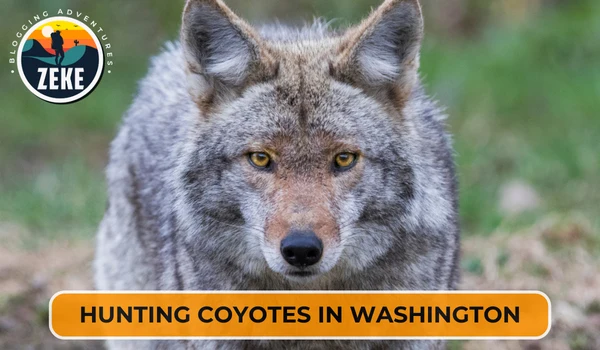
| Season | Dates | Bag Limit |
| Coyote | 01 Jan – 31 Dec | No Limit |
Rabbit Season
| Season | Dates | Bag Limit |
| Cottontail | 01 Sep – 15 Mar | 5 mixed bag daily |
| Snowshoe Hare | 01 Sep – 15 Mar | 5 mixed bag daily |
Fox Season
| Season | Dates | Bag Limit |
| Fox | 01 Sep – 15 Mar | No Limit |
Pheasant Season
| Season | Dates | Bag Limit |
| Western Washington Regular | 23 Sep – 30 Nov | 2 (Either Sex) per day |
| Western Washington Extended | 01 Dec – 15 Dec | 2 (Either Sex) per day |
| Western Washington Youth only | 16 Sep – 17 Sep | 2 (Either Sex) per day |
| Western Washington Senior/Disabled | 18 Sep – 22 Sep | 2 (Either Sex) per day |
| Eastern Washington Regular | 21 Oct – 15 Jan | 3 cocks per day |
| Eastern Washington Youth only | 16 Sep – 17 Sep | 3 cocks per day |
| Eastern Washington Senior/Disabled | 18 Sep – 22 Sep | 3 cocks per day |
Chukar Season
| Season | Dates | Bag Limit |
| Chukar (Eastern Washington) | 07 Oct – 31 Jan
16 Sep – 17 Sep (Youth only) |
6 per day |
Quail Season
| Season | Dates | Bag Limit |
| Mountain Quail (Western Washington) | 23 Sep – 30 Nov | 2 per day |
| California and Northern Bobwhite Quail (Western Washinton) | 23 Sep – 30 Nov | 10 mixed per day |
| California and Northern Bobwhite Quail (Eastern Washinton) | 16 Sep – 17 Sep | 10 mixed per day |
| California and Northern Bobwhite Quail (Eastern Washinton Youth only) | 07 Oct – 15 Jan | 10 mixed per day |
Dove Season
| Season | Dates | Bag Limit |
| Mourning Dove | 01 Sep – 30 Oct | 15 per day |
Band-tailed Pigeon Season
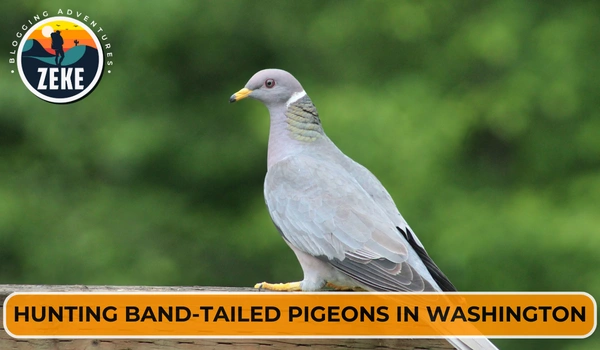
| Season | Dates | Bag Limit |
| Band-tailed Pigeon | 16 Sep – 24 Sep | 2 per day |
Partridge Season
| Season | Dates | Bag Limit |
| Gray Partridge (Eastern Washington) | 07 Oct – 15 Jan
16 Sep – 17 Sep (Youth only) |
6 per day |
Grouse Season
| Season | Dates | Bag Limit |
| Forest Grouse | 15 Sep – 15 Jan | 4 per day |
Crow Season
| Season | Dates | Bag Limit |
| Crow (Statewide) | 01 Sep – 31 Dec | No Limit |
Beaver Season
| Season | Dates |
| Trapping Only | 01 Nov – 31 Mar |
Badger Season
| Season | Dates |
| Trapping Only | 01 Nov – 31 Mar |
Mink Season
| Season | Dates |
| Trapping Only | 01 Nov – 31 Mar |
Marten Season
| Season | Dates |
| Trapping Only | 01 Nov – 31 Mar |
Muskrat Season
| Season | Dates |
| Trapping Only | 01 Nov – 31 Mar |
River Otter Season
| Season | Dates |
| Trapping Only | 01 Nov – 31 Mar |
Weasel Season
| Season | Dates |
| Trapping Only | 01 Nov – 31 Mar |
Duck Season
| Season | Dates | Bag Limit |
| Duck Season (Statewide) | 14 Oct – 22 Oct, 25 Oct – 28 Jan | 7 per day |
| Youth, Veterans & Active Military | 03 Feb | 7 per day |
| West Washington Youth | 23 Sep | 7 per day |
| East Washington Youth | 30 Sep | 7 per day |
Coot Season
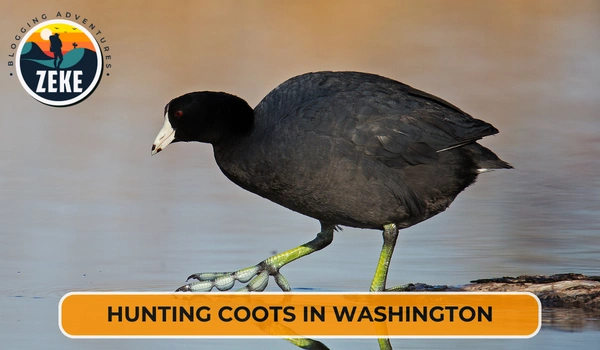
| Season | Dates | Bag Limit |
| Coot Season (Statewide) | 14 Oct – 22 Oct, 25 Oct – 28 Jan | 25 per day |
| Youth, Veterans & Active Military | 03 Feb | 25 per day |
| West Washington Youth | 23 Sep | 25 per day |
| East Washington Youth | 30 Sep | 25 per day |
Goose Season
| Season | Dates | Bag Limit |
| West Washington Canada Goose September (Mgmt Areas 1 & 3) | 02 Sep – 07 Sep | 5 per day |
| West Washington Canada Goose September (Mgmt Area 2) | 02 Sep – 10 Sep | 5 per day |
| West Washington Goose Regular (Mgmt Area 1) | 14 Oct – 26 Nov, 09 Dec – 28 Jan | 4 Canada Geese per day |
| West Washington White-Goose Late (Mgmt Area 1) | 10 Feb – 20 Feb | 20 White Geese per day |
| West Washington Goose Youth, Veterans & Military | 03 Feb | 4 Canada Geese per day |
| West Washington Goose (Mgmt Area 2) | 14 Oct – 29 Oct, 01 Nov – 03 Dec, 20 Dec – 21 Jan, 10 Feb – 21 Feb, 22 Nov – 14 Jan, 10 Feb – 06 Mar | 3 Canada Geese per day |
| West Washington Goose (Mgmt Area 3) | 14 Oct – 26 Oct, 04 Nov – 28 Jan | 4 Canada Geese per day |
| West Washington Youth (Goose Mgmt Areas 1, 2, 3) | 23 Sep | 4 Canada Geese per day |
| East Washington Canada Goose September (Mgmt Areas 4 & 5) | 02 Sep – 03 Sep | 5 per day |
| East Washington Goose (Mgmt Area 4) | 25 Oct – 28 Nov, 14 Oct – 22 Oct, 11 Nov – 21 Jan, 22 Jan – 28 Jan | 4 Canada Geese per day |
| East Washington Goose (Mgmt Area 5) | 14 Oct – 30 Oct, 04 Nov – 28 Jan | 4 Canada Geese per day |
| East Washington Youth (Mgmt Areas 4 & 5) | 30 Sep | 4 Canada Geese per day |
| East Washington Youth, Veterans & Military | 03 Feb | 4 Canada Geese per day |
Brant Season
| Season | Dates | Bag Limit |
| General | 06 Jan – 29 Jan | 2 per day |
| Youth | 03 Feb | 2 per day |
Snipe Season
| Season | Dates | Bag Limit |
| Snipe | 14 Oct – 22 Oct, 25 Oct – 28 Jan | 8 per day |
Washington Hunting License Information
Want to hunt in Washington? Make sure you have a valid hunting license, whether a local or just visiting. Luckily, getting this license is a breeze in Washington.
First, figure out your target. Washington boasts a rich game list of deer, elk, bear, turkey, waterfowl, and more. Depending on your choice, pick the right license.
If you call Washington home, you have two options: a Basic Hunting License for smaller creatures like birds and rabbits, and a Big Game License for the bigger ones like deer. Non-residents, however, can choose from three licenses – one for small game, another for deer/elk/bear/cougar, or a combo license for all.
You can easily buy your license online or at designated stores in Washington. Just keep your personal details ready. And a heads-up for young adventurers under 16 – you’ll need a licensed adult with you!
One last thing: all hunters should complete a hunter education course that covers firearm safety, responsible hunting, and conserving wildlife. But if you’ve done this elsewhere, Washington might just recognize it.
Where Can You Hunt in Washington?
If you’re looking for a real challenge and a chance to take some impressive trophies, head over east. The wild terrain of Washington is an ideal spot to hunt elk, deer, moose, and bighorn sheep. Don’t forget the binoculars – with these majestic critters around it’ll be quite the thrill!
For those into waterfowl hunting, go coastal – rivers and wetlands are full of ducks, geese, and swans. For the best experience during migration season, check out Skagit Valley.
Small game hunters should consider the Cascade Mountains for grouse or pheasant pursuits – they’ll test even experienced hunters with their quick reflexes and elusive nature.
Other great options include public lands like national forests or wildlife areas which provide sufficient opportunities for all types of hunts that are easy to access as well.
Public Hunting Places in Washington
Colville National Forest
Situated in the Northeastern corner of Washington State, Colville National Forest is a true paradise for hunters. Spanning over one million acres of lush terrain and abundant wildlife, there’s something here for everyone. From deer and elk to bear and cougar, you can explore vast hillsides and dense forests while keeping your eyes open for game.
The fall months are ideal times to hunt within these woods as animals become more active during this period. Be sure to check local regulations before heading out on your trip so that you know exactly what type of weapons are allowed in the area – permits may also be required depending on which species you’re targeting. Keep an eye out for small game such as rabbits, grouse, quail, or pheasants; even ducks and geese might make an appearance!
Ross Lake National Recreation Area
Located in the North Cascades of Washington state, Ross Lake National Recreation Area is an outdoor enthusiast’s paradise! It boasts over 100,000 acres of land and 30+ pristine lakes, making it an ideal spot for hunting. Black bears, elk, deer, grouse, and waterfowl can all be found in this diverse landscape – from open meadows to dense forests to rocky peaks there’s something here for every hunter.
If you’re looking for a place to stay while hunting in Washington, then look no further than Ross Lake; with plenty of campgrounds around the area plus cabins or boats available to rent – not only will your trip be comfortable but also convenient!
Best part? This recreation area is open year-round so regardless if you’re after some autumn elk or springtime duck hunting – this place has got it all covered.
Mount St. Helens Wildlife Area
Mount St. Helens Wildlife Area promises hunters a thrilling adventure amid its wild expanse. Here, you’ll find creatures ranging from elk, deer, and black bear to the elusive cougar, bobcat, and grouse. The landscape’s unique mix of rough terrains and diverse ecosystems welcomes hunters, whether novices or veterans.
Peak hunting season unfolds during the fall, specifically from August 15th to December 31st, as wildlife populations surge. However, be alert: species like elk and deer come with particular hunting rules. Before embarking on your journey, always consult local guidelines. Some regions might have extra rules or even be off-limits due to factors like fire risks.
Okanogan National Forest
Okanogan National Forest is an outdoor paradise for any hunter. Boasting over 1.4 million acres of diverse terrain and abundant wildlife, it’s a dream come true for anyone passionate about the sport. Elk are one of the most sought-after species in this forest – these majestic creatures roam free throughout its lands, offering thrilling hunting opportunities with proper permits and licenses.
But elk aren’t the only game here: quail, grouse, rabbits, and squirrels can all be hunted too! For those looking to add some avian prey to their trophy list, waterfowl near lakes and rivers should also be on your radar.
The best time to hunt in Okanogan National Forest is during autumn when animals are at their most active; however, no matter what season you visit, this incredible environment will take your breath away with its stunning views and abundance of wildlife year round!
Private Hunting Places in Washington
If you’re looking for a one-of-a-kind hunting experience, Washington has plenty of private hunting lands to explore. Before heading out, make sure you’ve got all the necessary permits and licenses in order.
Depending on what game you plan on hunting, different regulations may apply so double check with your local wildlife agency before going. Additionally, be aware of any land access restrictions – some places have specific rules regarding who can get access and when it’s allowed.
It’s important to research the target species so that you’re familiar with their behavior in different habitats; this way if unexpected events arise while out hunting in Washington, then you’ll know how best to respond or handle them accordingly.
